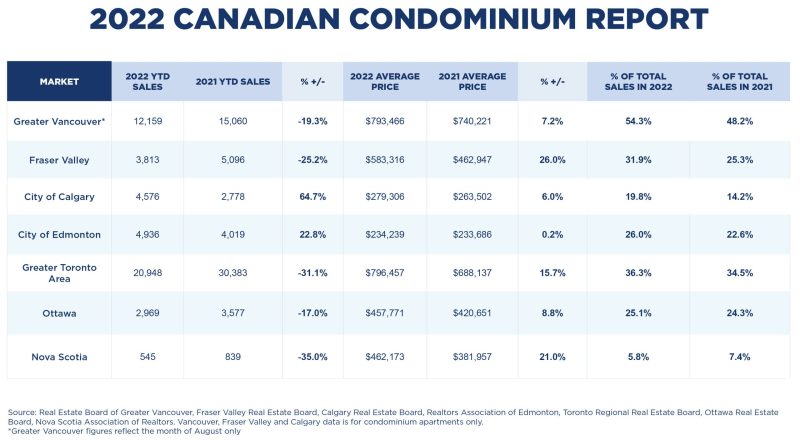Inflationary pressures have flattened overall housing values in the Nova Scotia real estate market, however uncertainty continues to hamper home-buying activity across the board. Condominium sales have slowed in tandem, down 35 per cent year-over-year, to 545 between January and August of 2022, compared to 839 condo sales during the same period in 2021.
The year-to-date average sale price, which rose 21 per cent to $462,173, largely reflects a robust first quarter of 2022, with values softening somewhat in the second quarter. Single-detached home pricing in certain areas is still within the reach of some first-time buyers, which has them opting for freehold properties as opposed to condos, providing they qualify for a mortgage. Still, entry-level condominiums offer buyers an opportunity to realize home ownership at a lower price point, with properties running at an average price of approximately $441,569 in the Halifax-Dartmouth area.
Condominium Trends in the Canadian Real Estate Market
Condominium market share has grown in major urban Canadian real estate markets yet again this year, a reflection of new market realities and the shifting course of entry-level buyers. RE/MAX Canada’s 2022 Canadian Condominium Report examined more than 120 communities in six major markets, including Greater Vancouver/Fraser Valley, Calgary, Edmonton, Greater Toronto, Ottawa and Nova Scotia. The report found that condominium sales were down in the first eight months of 2022 in four regions, including Greater Vancouver/Fraser Valley, Greater Toronto, Ottawa and the Nova Scotia real estate market, while Calgary and Edmonton reported double-digit sales increases over the same period in 2021. Condo values are up in almost all markets year-over-year, with many bolstered by a robust strong first quarter.
Condominium market share, as a proportion of total Canadian real estate sales, advanced across the board, with upswings reported in five out of six markets analyzed, ranging from a low of 0.08 per cent in Ottawa to a high of 6.6 per cent in the Fraser Valley. Compared to year-to-date levels one year ago, condominiums now represent just over 54 per cent of total residential sales in Greater Vancouver, 36.3 per cent of residential sales in the Greater Toronto Area, almost 32 per cent of sales in the Fraser Valley, just over one in four sales in Edmonton and Ottawa, and almost one in five sales in Calgary. Nova Scotia was the only market to register a decline in condominium market share.

“The affordability factor is the key issue in today’s housing market,” says Christopher Alexander, President, RE/MAX Canada. “Rising interest rates have slowly eroded purchasing power and, despite lower housing values and cooling market conditions, buying a house is more challenging now than ever before. For those who have adjusted expectations with every rate hike, the cost of carrying a mortgage versus renting is now more comparable, given sharp double-digit increases in rental rates throughout the major markets, but especially in BC and Ontario. So, while fewer sales have occurred in 2022, condominiums represented a greater proportion of overall sales, as buyers gravitated to affordable options to achieve home ownership.”
The post Nova Scotia Real Estate: Robust Q1 Pushes Condo Prices Up 21% appeared first on RE/MAX Canada.
